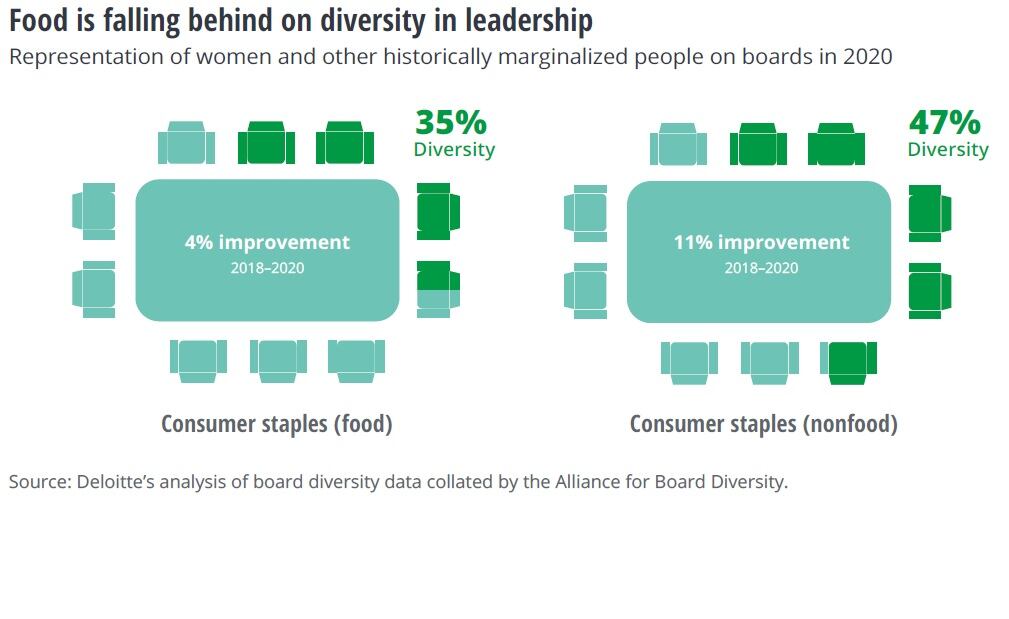Unfortunately, the report published this week, found the food and beverage industry is falling behind other segments in achieving ambitious diversity, equity and inclusion goals, including those set last year in response to social justice protests led by the Black Lives Matter movement and other often marginalized groups.
This shortcoming not only could delay food and beverage companies’ ability to recruit and retain employees in a very tight labor market, but it could erode consumer loyalty, warns the report.
“At the end of the day, potential employees, and consumers for that matter, are smart. They know which companies are merely talking and which getting results. They will likely increasingly want to do business with organizations that are making material progress in DEI,” the report notes.
Leadership at most retailers, product suppliers do not reflect larger population
According to the report, an “overwhelming” 86% of the more than 150 US-based food industry executives surveyed between April and May 2021 citing making significant progress on DEI goals was a top priority for the leadership team.
In addition, 68% said training employees on diversity and inclusion was one way their organizations were addressing future workforce challenges.
And yet, the vast majority of director-level positions in the consumer staples food segment were not diverse or representative of the larger population.
Deloitte and FMI found women and historically marginalized people made up only 35% of board members at consumer staple food companies compared to 47% in the non-food consumer staples segment.
The improvement in board diversity also was lower in the food industry between 2018 and 2020 at only 4% compared to 11% in the nonfood segment, the report notes.
Likewise, it found, 58% of food retailers acknowledged that their leadership composition was still under representative of the larger population and 15% said they didn’t know if it was. Only 27% said their leadership was sufficiently representative of the larger population.
Similarly, 65% of product suppliers acknowledged that their leadership composition did not reflect the larger population, 5% didn’t know and 30% said their leaders sufficiently represented the larger population, according to the report.
Despite stagnate diversification efforts at the board level, two-thirds of industry executives surveyed said their companies were effectively promoting DEI ideas and 70% believed these efforts were creating a better workplace for employees.
Strategies for diversifying and creating more inclusive companies
To further cultivate a more inclusive and diverse workplace that will differentiate brands to prospective employees and customers, Deloitte and FMI recommend in the report that companies focus first on diversifying their leadership teams and then leveraging those changes and leaders to expand diversity through the ranks.
Simultaneously, companies should diversify talent two to three tiers below senior leadership to “help ensure the right talent is available when senior positions do open,” and to create “more equitable outcomes and career mobility for historically marginalized groups which otherwise can be trapped at the lower ranks of the organization.”
This will require establishing clear metrics and goals for diversification as well as implementing incentives for achieving them, the report advises.
“Vague commitments to make improvements aren’t as clear as pledging that your workforce will reflect the diversity of the population and the customers you serve with milestones on a timeline,” it explains.
The report further adds that “the most successful companies will likely approach DEI more broadly” than at the organizational level to include their “greater spheres of influence in the marketplace and even in society at large.”
This can be done by partnering with businesses led by marginalized people, creating inclusive marketing and tackling social challenges related to socio-economic and racial factors.




